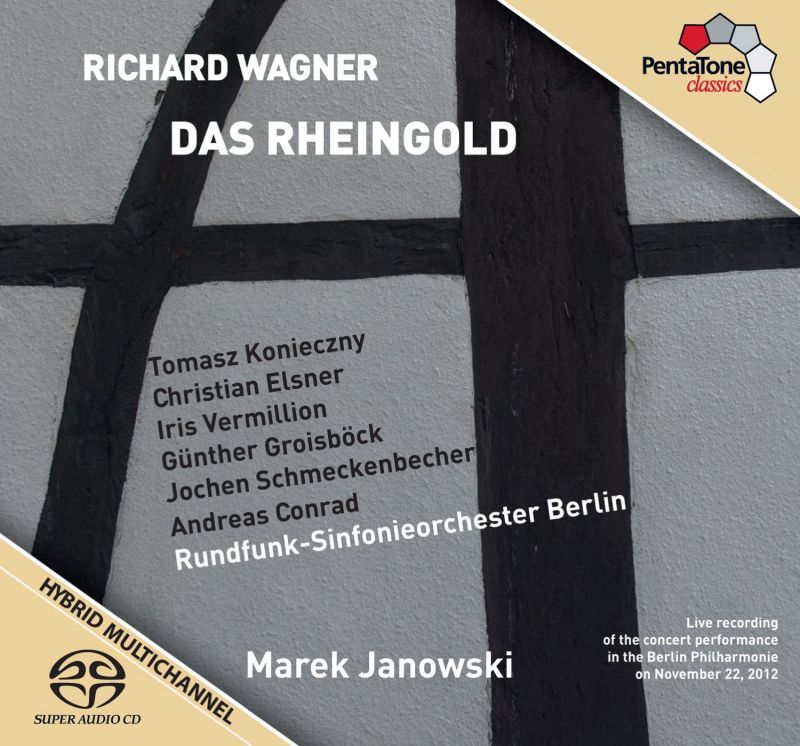WAGNER Das Rheingold
The Janowski Wagner cycle’s Ring finally begins
View record and artist detailsRecord and Artist Details
Composer or Director: Richard Wagner
Genre:
Opera
Label: Pentatone
Magazine Review Date: 09/2013
Media Format: Super Audio CD
Media Runtime: 140
Mastering:
DDD
Catalogue Number: PTC5186 406

Tracks:
| Composition | Artist Credit |
|---|---|
| (Der) Ring des Nibelungen: Part 1, '(Das) Rheingold' |
Richard Wagner, Composer
Andreas Conrad, Mime, Tenor Antonio Yang, Donner, Baritone Berlin Radio Symphony Orchestra Christian Elsner, Loge, Tenor Günther Groissböck, Fasolt, Bass Iris Vermillion, Fricka, Mezzo soprano Jochen Schmeckenbecher, Alberich, Baritone Julia Borchert, Woglinde, Soprano Katharina Kammerloher, Wellgunde, Mezzo soprano Kismara Pessatti, Flosshilde, Contralto (Female alto) Kor-Jan Dusseljee, Froh, Tenor Marek Janowski, Conductor Maria Radner, Erda, Contralto (Female alto) Ricarda Merbeth, Freia, Soprano Richard Wagner, Composer Timo Riihonen, Fafner, Bass Tomasz Konieczny, Wotan, Baritone |
Author:
Canary-obsessives may not read so many names of that ilk to detain them here but those with open ears to the characterisation of this opera should be as pleased as they were with Janowski’s casting of the predecessors in Pentatone’s ‘mature’ Wagner cycle. Konieczny is a gone-up Alberich, not always a dream recipe for a Wotan but here exercising the authority and duplicity (if not quite the vocal splendour) of a young George London. In keeping with Janowski’s habitual avoidance of caricature, Schmeckenbecher is a flexible Alberich, dark enough to rob the world of love but no pantomime dwarf. Elsner, Janowski’s earlier Parsifal, is, again, no Gerhard Stolze of a mannered Loge but a straighter-sounding, aurally cunning, dangerous adversary. Vermillion and Merbeth – a Janowski favourite – bring a lot of fresh, unmannered colour to their roles.
But the real secret ingredient here is the conductor himself who, having rather laid back on dramatic, ‘operatic’ involvement in the series’s previous releases, lets himself and his Berliners go in the violence of Nibelheim and the gold ransom. What was a little too calm and remote in the earlier Dresden recording now has real cojones, which carries over properly into the ensuing Wotan/Alberich clash.
The recorded sound is beautiful and natural in the orchestra and in balance with the singers. Beckmesser must point out that there are one or two moments in the opening Rhine scene when the girls (but not the orchestra) sound a little surprised at Janowski’s swift tempi but, if you’ll pardon the phrase, it all comes out in the wash. This is both a great start to Janowski’s new Ring cycle and a competitive Rheingold in its own right alongside the mandatory Clemens Krauss (Pristine please, not Orfeo), Karl Böhm, Solti, Furtwängler and Barenboim.
Discover the world's largest classical music catalogue with Presto Music.

Gramophone Digital Club
- Digital Edition
- Digital Archive
- Reviews Database
- Full website access
From £8.75 / month
Subscribe
Gramophone Full Club
- Print Edition
- Digital Edition
- Digital Archive
- Reviews Database
- Full website access
From £11.00 / month
Subscribe
If you are a library, university or other organisation that would be interested in an institutional subscription to Gramophone please click here for further information.




